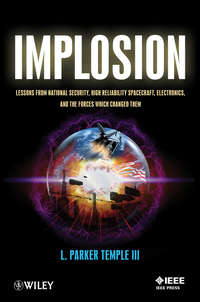L. Parker Temple - Implosion. Lessons from National Security, High Reliability Spacecraft, Electronics, and the Forces Which Changed Them

Implosion is a focused study of the history and uses of high-reliability, solid-state electronics, military standards, and space systems that support our national security and defense. This book is unique in combining the interdependent evolution of and interrelationships among military standards, solid-state electronics, and very high-reliability space systems. Starting with a brief description of the physics that enabled the development of the first transistor, Implosion covers the need for standardizing military electronics, which began during World War II and continues today. The book shows how these twin topics affected, and largely enabled, the highest reliability and most technologically capable robotic systems ever conceived. This riveting history helps readers: Realize the complex interdependence of solid-state electronics and practical implementations in the national security and defense space programs Understand the evolution of military standards for piece parts, quality, and reliability as they affected these programs Gain insight into the attempted reforms of federal systems acquisition of security- and defense-related space systems in the latter half of the twentieth century Appreciate the complexity of science and technology public policy decisions in the context of political, organizational, and economic realities Written in clear, jargon-free language, but with plenty of technical detail, Implosion is a must-read for aerospace and aviation engineers, manufacturers, and enthusiasts; technology students and historians; and anyone interested in the history of technology, military technology, and the space program.









